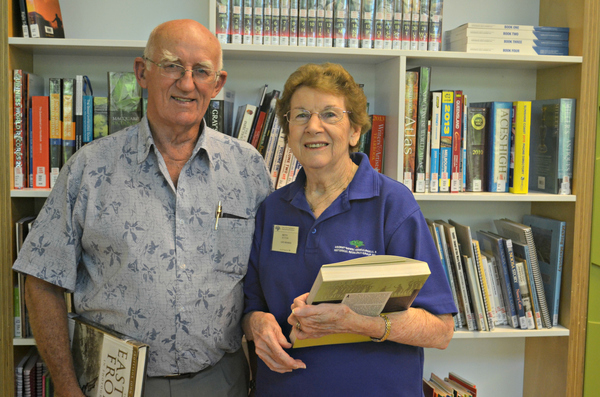By KATIE DE VERTEUIL
WHILE locals Ron and Betty Sutton were young children at the time World War II broke out in the September of 1939, their memories are vivid, as if it were only yesterday.
Born in Sunny Brae Hospital at Eumundi in 1934 and growing up in Belli Park, Ron was aged five at the time.
Betty, who comes from a property between Cooroy and Eumundi, was only three.
“My earliest memories were of wartime of course,” Betty said, taking a step back in time.
“I was born in 1936 and started school in 1941 so the war was raging and as children, we didn’t remember anything else.
Betty recalled while riding her horse to school, passing army convoys headed to north Queensland to train and to acclimatise.
“I clearly remember the searchlights at night searching for enemy aircraft; the lights were really eerie but we got used to it. It was just part of life.”
Two years older than Betty, Ron also attended school during wartime.
“Belli Park was a one-teacher school of about 25 children, from Preparatory classes to Grade 7,” Ron said.
“During the war, we saw a lot of convoy traffic almost continuously on the narrow gravel road, and there were many large training camps around the district.
“We schoolkids walked along the cattle tracks beside the road to avoid the dust and danger.
“Of course this did not stop us from trying to get the soldiers to throw us tins of bully beef and dog biscuits as they passed. These rations were not so palatable when, as “Nashos” (National Servicemen) in the 1950s, we were fed the same stuff when on exercises.These rations were a constant reminder of the war.
“The war is still quite vivid to me because of the camps that we were around,” Ron said.
“The convoys were there all the while and there was a firing range up the creek, about half a mile, and though we were just kids, we knew very well what was going on there.”
Both growing up on farms, Ron and Betty often had visits from local soldiers for supplies.
“There were army camps all around the district and occasionally a soldier came through the farm, while they were on exercises,” Betty added.
“I remember one chap called in and asked for a glass of milk.”
While their parents spoke little of the happenings of war, the fear was there.
“When we visited our grandparents in Tewantin, the adults talked of Mussolini, Churchill, and Hitler of course … they were sort of household names.
“We knew the Japanese were enemies and that Hitler was a bad man, but I suppose as just kids then, we played around and didn’t take much notice, but the fear was there.”
Betty’s father Roy Duke served in the VDC (Voluntary Defence Corps) in WWII, while Ron’s was exempt due to being a dairyfarmer, a role which was part of the essential industries.
Rationing was another huge part of wartime in the small country town.
“Fuel, food, and clothing was all rationed,” Ron said.
“Luckily on the farms it wasn’t quite so bad as things like butter and meat were always there.
“But the rationing of petrol and tyres did made things hard.”
When the war finally came to an end in 1945, Ron and Betty remembered the occasion as joyous, however with little difference to any other day.
“I think we went to school just the same,” Ron said.“I guess it came over the news and we all threw our hats in the air and said hooray.
“The children were issued a victory medal with a red, white and blue ribbon.
“But it was a long while before much changed.
“The rationing remained for another four years until the change of government in 1949.”
While they knew of each other all their lives having grown up in the same area, Ron and Betty didn’t officially meet until their teenage years.
Now aged 80 and 78 respectively, Ron and Betty are 59 years married, active members of the Cooroy community and strongly involved in this year’s Anzac commemorations.








